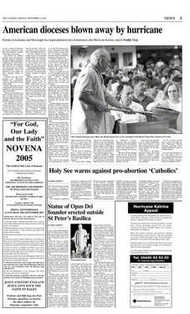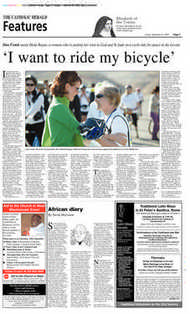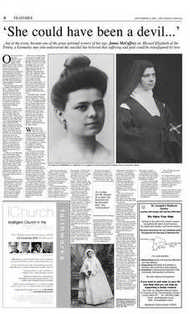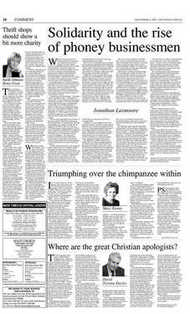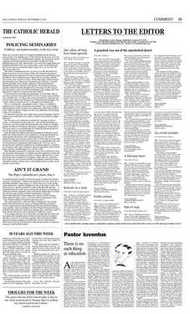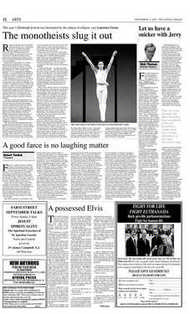Page 11, 9th September 2005
Page 11

Report an error
Noticed an error on this page?If you've noticed an error in this article please click here to report it.
Tags
Share
Related articles
Brazilian Cardinal Begins New Job By Clarifying Remarks...
Seminaries Under The Microscope As Gay Ruling Hangs In...
Vatican Investigates Scandal-hit Seminary
From Mr Terence Reid Sir – Thank You For Publishing
Vatican Notes Progress In Us Seminaries
THE CATHOLIC HERALD
Established 1888
POLICING SEMINARIES
Celibacy, not homosexuality, is the key issue
There are occasions when we should be thankful that the Roman Curia moves at an arthritic pace. If the Vatican bureaucracy were run with the efficiency of a multinational company, the instruction on the admission of homosexual men to seminaries would have been published long ago. But, almost three years after the Congregation for Catholic Education first set to work on this controversial document, the text has not yet reached the Pope’s desk. Or so we are told. No one seems quite sure.
This delay is fortunate because, it seems to us, the first draft was badly misconceived. According to leaks, the document proposed a blanket ban on the admission of men of homosexual orientation to the priesthood. This would have been impossible to reconcile with the Catechism of the Catholic Church, which states that, while homosexual inclinations are objectively disordered, gay Catholics “can and should gradually and resolutely approach Christian perfection” through the practice of prayer and chastity. The ruling would have unjustly barred from the priesthood men who had won the struggle for self-mastery and were wholly committed to the celibate life, and therefore it would have impoverished the Church.
It seems that the instruction has undergone several drafts since it was first mooted in November 2002. It is by no means clear what the text currently says; it is likely that it does not impose a total ban, but rather warns bishops that the presence of homosexual ordinands who “assert a right to sexual activity” is disruptive of seminary life.
This is a valid point – unarguable, in fact – but is it a sufficient response to the scandal of priestly sexual abuse? For, even though a high proportion of the victims were young men, rather than children, every single incidence of abuse involved, by definition, the breaking of the vow of celibacy.
It is therefore upon this vow, rather than sexual orientation, that the Church must concentrate if it wishes to address the problem comprehensively.
This becomes clear when one considers the situation in Africa, where – as the Pope himself points out – the current flourishing of vocations is not necessarily an unmixed blessing. There are credible reports of African seminarians and priests engaging in sexual affairs. The abuse there is overwhelmingly of a heterosexual nature but it is not, for that reason, any less iniquitous.
Pope Benedict has rightly made the elimination of priestly sexual abuse one of the priorities of his pontificate. As universal pontiff, he must consider the matter from a global perspective. He needs to remind bishops and seminary rectors that it is their duty to ensure that all priestly candidates have lived chastely for a considerable time and are unequivocally committed to the celibate life. The best way to ensure that this standard is upheld is by stringent apostolic visitations of seminaries. One such visitation is about to take place in the United States, but they should happen all over the world.
Pope Benedict must not be swayed by those who wish him to issue the document immediately. It would be absurd to publish it before the visitations have even begun and before Vatican officials have a clear idea of the state of America’s seminaries. Only after the visitations have ended can the Curia be sure that its guidance is based on sound empirical evidence and provides a meaningful response to the evil of priestly sexual abuse.
blog comments powered by Disqus






